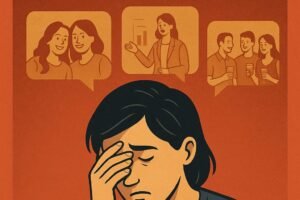Yesterday I saw the latest movie Sitare Zameen Par. And as a psychology student, it hit differently. I didn’t just watch the film—I felt it.
What Is “Normal,” Really?
“Sabka apna apna normal” – What’s not normal for you,might be everyday life for someone else. For you, disoriented speech may be confusing. But for them, it’s the only way they’ve ever known how to express themselves. For you, a 30-year-old behaving like an 8-year-old might seem “off.” But for them, that is normal.
A Mirror to Society’s Bias
The movie seriously felt like a mirror to real life. Because let’s be honest – 90% of so-called “normal” people would deny even interacting with someone who’s different. Just like the basketball coach in the film. He didn’t even try to know them, didn’t see their potential, he just looked once and labelled them – “Pagal” (mad), and refused to teach.
The Pain Behind Simple Words
And then there were those scenes that didn’t need background music to hurt – just raw truth, spoken by the children themselves.
“We know no one wants a child like us… they want a healthy child.” Simple words. But they carry the weight of being unwanted.
The Ego We Never Address
And honestly, isn’t this just the Ego we carry? Treating them as inferior just because they’re not like us?
Calling ourselves normal—but based on what?
What defines Normal ?
What defines this “normal”? Is the child with speech delay abnormal? Or is the man who raises his hand in the name of power, hurts others with full awareness, yet walks free—normal?
We never question them.
We never label them as “abnormal,”even though they choose cruelty, corruption, and violence withwith a brain that’s considered “perfect.”
Isn’t it ironic? That we measure normalcy by how someone speaks or walks, but not by how someone treats another human being?
What Really Needs Healing
Maybe it’s not their condition that needs rethinking. Maybe it’s our definition of normal that truly needs healing.
So maybe it’s time we stop trying to “fix” them, and start unlearning our own rigid definitions.
Because they are normal too – just in a way that the world isn’t used to yet.
A Shift in Perspective
We all have our own ways of thinking, feeling, and behaving. Their world might look different from ours, but it’s not less. It’s not wrong. It’s just theirs. And if we choose to understand instead of a question, to accept instead of exclude—we’ll realise something powerful:They don’t need to learn from us.We need to learn from them.
The Final Truth
Because in the end, sabka apna apna normal hota hai. And that’s more than enough.
And let’s not forget – it could have been us too.
Sometimes, it’s just a matter of one chromosome.



